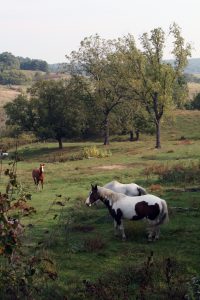 An unvaccinated St. Croix County mare is the first in Wisconsin to contract West Nile Virus (WNV), prompting a reminder to horse owners to vaccinate their animals against the virus and Eastern equine encephalitis (EEE), two mosquito-borne diseases that together have stricken hundreds of horses in Wisconsin since 2001. The 4½-year-old quarter horse is recovering after being treated by a veterinarian.
An unvaccinated St. Croix County mare is the first in Wisconsin to contract West Nile Virus (WNV), prompting a reminder to horse owners to vaccinate their animals against the virus and Eastern equine encephalitis (EEE), two mosquito-borne diseases that together have stricken hundreds of horses in Wisconsin since 2001. The 4½-year-old quarter horse is recovering after being treated by a veterinarian.
“The cooler, wetter spring delayed a mosquito outbreak in parts of the state, but now that things are heating up it creates the perfect breeding environment for mosquitos,” says State Veterinarian Dr. Paul McGraw of the Wisconsin Department of Agriculture, Trade and Consumer Protection. “Cases of EEE have now emerged in southern states and now WNV has been detected in a horse in Wisconsin.”
Horses require two doses of the vaccination initially, and then boosters at least annually. “We recommend working with your veterinarian, so you get the best plan for your horse and advice about additional boosters later in the season,” McGraw says.
Both WNV and EEE are caused by viruses transmitted by mosquitoes, and both may cause encephalitis, or inflammation of the brain. EEE kills about 90 percent of horses that it strikes, and WNV kills in more than a third of all equine cases. Symptoms are similar for both diseases: depression, appetite loss, drooping eyelids and lower lip, fever, weakness, twitching, paralysis or lack of coordination, aimless wandering, circling and blindness.
Neither of the viruses is contagious between horses. While humans can become infected by both WNV and EEE, it does not pass between people and horses. Mosquitos biting warm-blooded animals is the only method of transmission.
Besides vaccination, McGraw recommends taking other steps to limit horse exposure to mosquitoes:
- Remove items from surrounding property that could collect stagnant water such as old tires, tin cans, plastic containers.
- Keep rain gutters clean and draining properly.
- Clean and chlorinate swimming pools, outdoor saunas and hot tubs, and drain water from pool covers.
- Turn wading pools and wheelbarrows upside down when not in use.
- Empty and replace water in birdbaths at least once a week.
- Consider keeping horses in the barn from dusk to dawn, when mosquitoes are most active.


Leave a Reply